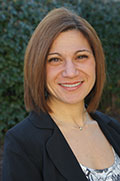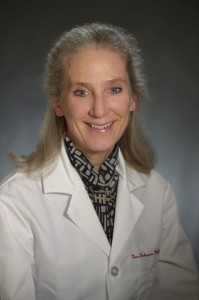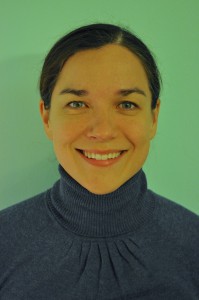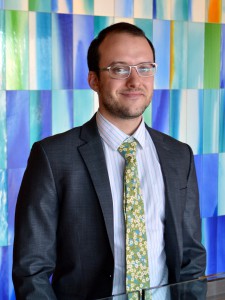This month, recently elected ECNG officers took their places on the Executive Committee and the new Mentoring Task Force was formed. Read on to meet Megan Mitchell, Chair; Dawn Neumann, Past-Chair; Nora Johnson, Chair-Elect; and task force chairs, Mathew Doiron and Meghan Geiss. Feel free to contact them with questions and ideas or to get involved, and be sure to watch for more ECNG leadership profiles coming next month!
Megan Mitchell, PhD
ECNG Chair
Dr. Mitchell has a doctorate in Biomedical Engineering, with a focus in rehabilitation engineering and clinical research. Her research passion and interests focus upon clinical interventions stimulating bone and muscle health in non-ambulatory populations. Her past research has included investigating a novel dynamic standing program in non-ambulatory children and its impact on bone mineral density, as well as the investigation of methods of optimization for electrical stimulation protocols in individuals with spinal cord injury for maximal bone and muscle health.
While Dr. Mitchell is currently taking family leave, she intends to re-enter the field in an academic/research position and continue her work investigating the optimization of clinical interventions to produce maximal bone and muscle health within non-ambulatory populations. Dr. Mitchell’s career path has been inspired by the desire to assist in bridging the gap between the engineering and clinical fields, providing data for evidence-based interventions and maximizing the clinical benefits of these interventions. She is currently serving as chair of the ACRM Early Career Networking Group and is open for networking and collaboration opportunities.
Key words on research: non-ambulatory, bone, muscle, pediatrics, SCI, clinical interventions, loading, electrical stimulation

Dawn Neumann, PhD
ECNG Past Chair
Hello all! It has been four years since completing my postdoctoral fellowship at Carolinas Rehabilitation. Prior to my postdoc, I earned an MA in Psychology from Rutgers, NJ and my PhD in Rehabilitation Science from the University at Buffalo, SUNY. Currently, I am an Assistant Research Professor at the Indiana University School of Medicine in the Department of Physical Medicine and Rehabilitation, and a Clinical Research Associate at the Rehabilitation Hospital of Indiana. I am also the Director of the Indiana University Interactive and Functional Assessment of Communication and Emotion (InterFACE) Center at the Rehabilitation Hospital of Indiana.
As a clinical researcher, I am passionate about the study and treatment of emotional processing and regulation deficits after traumatic brain injury (TBI). I am particularly interested in nonverbal communication, social cognition, alexithymia, empathy loss, irritability and aggression, and relationship problems after TBI. I am also the Founder of a small spin-up business, EmotEd, LLC. Our company was awarded a small business grant from the NIH to develop therapeutic videogames designed to treat emotional deficits after traumatic brain injury.
Interestingly, I never envisioned myself as a researcher struggling to get grants and publications. Formerly, I worked as a cognitive therapist for people with brain injuries at various rehabilitation facilities in NJ back in the late 1990’s. I found it very frustrating that there was no structured or evidence-based approach for the treatment of cognition after brain injury. There were so many uncertainties, that I decided to go back to school. I got involved in clinical research and felt it was a perfect match that combined my love of working with people with brain injuries, developing interventions, and empirically evaluating outcomes at a larger level. The life of a researcher is not an easy one, but the potential rewards and the prospect of making large scale contributions to changing the quality of life for people with brain injuries, is what drives me every day.
For two years, I served as chair of the Early Career Networking Group, and I am now serving as the Past Chair. Currently, I am the Co-Chair of the ECNG Communications Task Force and the Social Planning Task Force. I am also active in the ECNG Early Career Development Course Task Force. Additionally, I was recently elected as the Program and Awards Officer for the ACRM Brain Injury Interdisciplinary Special Interest Group (BI-ISIG). I am also a member of the Membership Committee and Program Committee. My involvement in ACRM, especially the ECNG, has been truly rewarding and invaluable to my career development. That said, I am definitely open to being contacted by ACRM and ECNG peers for potential networking and/or collaboration opportunities.
Key Words: traumatic brain injury, emotional deficits, affect recognition, anger and aggression, social cognition, and empathy.

Nora Johnson, MBA, MS, PsyD, ECNG
Chair-Elect
Dr. Johnson is a licensed psychologist who specializes in clinical neuropsychology at the Clinical Practices of the University of Pennsylvania in Philadelphia. She is a clinician providing cognitive and emotional evaluations to medical inpatients and outpatients in the Department of Physical Medicine and Rehabilitation. Patient populations include spinal cord injuries, strokes, transplants, orthopedic injuries, and a range of co-morbidities. Dr. Johnson is finishing her early career stage in psychology specializing in mood and personality disorders, pain management; stress and anxiety reduction, individual and family therapy; mediating staff and patient conflicts; and educating staff and patients about mood and anxiety disorders that present co-morbidly with the aforementioned populations. She participated in the APA’s field research for the 5th edition of the Diagnostic and Statistical Manual of Mental Disorders. Dr. Johnson also serves as ombudsman for the resident physiatrists at the Penn Institute for Rehabilitation Medicine in her hospital. Past publications include articles on workplace issues and how personality disorders affect others in the workplace.
As the Chair-Elect of the ECNG, Dr. Johnson is giving special attention to the newly formed Mentoring/Advising Task Force and the Communications Task Force. Previous careers were as a business analyst consulting for corporate IT conversion projects, a business and technical writer, and an athletic career as a distance runner.
Key words: pain management; workplace issues, psychosocial disorders co-morbid with medical condition
Mathew Doiron, BA
Co-Chair ECNG Communications Task Force
I am a graduate Student at Drexel University in Clinical Psychology PhD program, with a concentration in Neuropsychology. I previously received a BA in Psychology and Philosophy at Hofstra University in Hempstead, NY. As a clinical graduate student, I consider myself an academician, clinician, and researcher. My primary interests involve moderate/severe brain injury and disorders of consciousness. I currently work in Drexel’s Applied Neuro-technologies Lab where we use varying technologies i.e., driving simulators, fNIRS, computerized testing, to develop modern and novel approaches to cognitive assessment.
I am currently involved with the ACRM ECNG as co-chair of the Communications Task Force, and I am also active in the BI-ISIG Disorders of Consciousness Task Force. I am open to being contacted by ACRM and ECNG peers for potential networking and/or collaboration opportunities.
A little background on what inspired my career path. Growing up with an aerospace engineer as a dad, I was always interested in how things worked. When I took a Clinical Neuropsychology class as an undergrad, our professor invited some of her patients to tell their stories of their brain injury and rehabilitation; I was immediately hooked. Seeing how damage to the brain caused different autonomic and behavioral changes was fascinating to me. Since I still have a passion for technology and engineering, my dad’s engineering friends still ask “Why didn’t you go into engineering?” Now, I simply tell them, “I did. I reverse-engineer the most complex computer on the planet.”
Key words that describe my work interests: neuropsychology, traumatic brain injury, moderate/severe brain injury, disorders of consciousness, technology

Meghan Geiss, PhD
Co-Chair ECNG Mentoring Task Force
After earning my PhD in Counseling Psychology from the University of Memphis in 2013, I accepted a rehabilitation psychology postdoctoral fellowship at the Hunter Holmes McGuire VA Medical Center in Richmond, Virginia where I am currently transitioning to my second year. I maintain the roles of clinician (75%) and researcher (25%) working with the US military service member/veteran population addressing post-acute rehabilitation issues relating to traumatic brain injury.
My primary clinical interest includes neuropsychological assessment of adult veterans presenting with complex medical/psychological/psychosocial profiles. My current research interests include TBI and sleep related issues. I became a member of ACRM in April, 2014 and have thoroughly enjoyed increasing involvement in the ECNG, BI-ISIG, and the Military and VA Networking Group. My career path has been inspired most notably by influential mentorship, opportunities, and personal life experiences. Therefore, I openly welcome being contacted by my ACRM and ECNG peers for potential networking and/or collaboration opportunities.
KEYWORDS: Rehabilitation Psychology, Neuropsychology, Brain Injury, Sleep, Veterans
<<< Return to ECNG Newsletter // Nov











